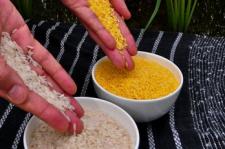Why scientists' failure to understand GM opposition is stifling debate and halting progress
By Sarah Hartley,
The Conversation
| 07. 07. 2016
Genetically modified crops are safe for human consumption and have the potential to feed the world and improve human health, scientists have been telling us for years. On June 30, 110 Nobel laureates from around the world signed a letter demanding that the environmental pressure group Greenpeace stop its campaign against GM crops. How many people must die before we consider this a “crime against humanity”? the letter asks.
The scientists are accusing Greenpeace of ignoring facts, misrepresenting risks and benefits, failing to recognise the authority of science and relying on emotion and dogma. They are particularly concerned about Greenpeace’s opposition to Golden Rice, which has an added gene that boosts vitamin A levels – something scientists claim is much needed in many poor populations.
But Greenpeace argues that there are cheaper and more effective alternatives to Golden Rice and that GM rice developers are out of touch with the needs of local populations. It also claims developers are downplaying the risk that GM rice will contaminate traditional and organic rice crops.
The eminent scientists appear to have learned...
Related Articles
By Arthur Lazarus, MedPage Today | 01.23.2026
A growing body of contemporary research and reporting exposes how old ideas can find new life when repurposed within modern systems of medicine, technology, and public policy. Over the last decade, several trends have converged:
- The rise of polygenic scoring...
By Stephanie Pappas, LiveScience | 01.15.2026
Genetic variants believed to cause blindness in nearly everyone who carries them actually lead to vision loss less than 30% of the time, new research finds.
The study challenges the concept of Mendelian diseases, or diseases and disorders attributed to...
By David Cox, Wired | 01.05.2026
As he addressed an audience of virologists from China, Australia, and Singapore at October’s Pandemic Research Alliance Symposium, Wei Zhao introduced an eye-catching idea.
The gene-editing technology Crispr is best known for delivering groundbreaking new therapies for rare diseases, tweaking...
By Josie Ensor, The Times | 12.09.2025
A fertility start-up that promises to screen embryos to give would-be parents their “best baby” has come under fire for a “misuse of science”.
Nucleus Genomics describes its mission as “IVF for genetic optimisation”, offering advanced embryo testing that allows...




